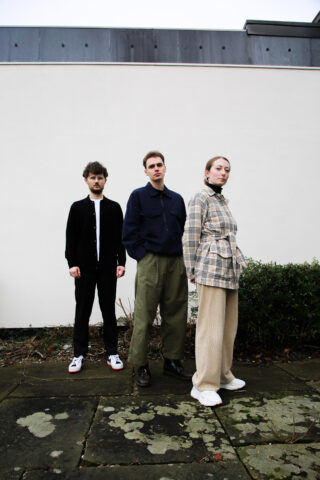Regressive Left: Everything’s political, even when you want to just make people dance
The sound of New York through the decades - but from Luton

The sound of New York through the decades - but from Luton
“We’re waiting for the invite from GB News to interview us on their programme,” says Will Crosby with a smile as bandmates Simon Tyrie and Georgia Hardy produce symmetrical eye-rolls.
“Well, we want to reclaim the term,” says Tyrie. “To be honest, I thought it had gone out of fashion but it’s become apparent people are still using it.”
To be ‘regressive left’ is to be a far-left zealot who supports extremist ideologies. It’s just a matter of time, though, until the slogan is synonymous with angular art-pop from Luton instead.
“We think it’s more popular in America than it is in the UK,” says Crosby, “but people like GB News – I know we keep mentioning them and we shouldn’t give them as much airtime – those kinds of organisations have been using it more and more. They’re trying to bring it back.”
“We weren’t sure if we would attract neo-Nazis or the other end of the spectrum,” says Tyrie. “Either way, it works out fine. We bring the left because they understand the irony, or we bring the right because they think we are being serious.” He arches his eyebrow. “Everything is political.”
Content to live both inside and outside the culture war, Regressive Left are quick to point out this is not a call to arms but more a call to listen. “We really like the fact that because of our band name people will approach everything politically,” says Crosby. “The idea of them finding hidden political meaning in some of the more nonsense lyrics, like what’s the political meaning of having hand lotion in ‘Cream Militia’, I don’t know.”
The hand lotion lyric (“You got notions / You got lotion / You got who knows what”) arrives midway through the band’s third single in a run of impressive, club-ready, distorted dance-punk tracks, released by a band riding a wave of post-pandemic creativity. “We have all played music in various unsuccessful bands before, since we were around 15,” says Hardy, “but I think with this project we weirdly cared less about it being a success. It got to the point where we were so busy with our day jobs, and just life around lockdown, that when we were making music it was just for fun and a release. We finally wanted to play what we really liked and wanted to hear.
“As musicians we all come from different backgrounds,” she says. “I come from funk, soul and disco, whereas Simon was brought up with guitar music and Will was classically trained. The lineage that we all cross paths on was that DFA, punky stuff. Music like ESG encompassed everything we were interested in.” Crosby agrees, doubling down on Hardy’s comments. “It’s basically those two little bits of New York,” he says, “– late ’70s and early ’80s New York mixed with late ’90s and early 2000s New York.”
“One of the things we wanted to make sure we achieved with these songs was making them danceable,” says Tyrie. “After the various bands we had been in before, this one had to be different, so during the pandemic we were just jamming together and playing stuff inspired a little by our DJing. So far, all our music has a groove to it – we haven’t written anything slow and sultry yet.”

There’s a real connection between this group of friends glued together through years of putting on gigs whilst packing (and clearing) dance floors, and there’s no doubt that Regressive Left’s sound has been shaped by their love for throwing a party, from jazz events in Luton to DJing ’80s hits at Hackney’s Moth Club. “I just love seeing people having a good time and knowing that you were the person who orchestrated that, so I am definitely not scared to play the bangers,” laughs Hardy, who as well as promoting shows under the name Spilt Milk also co-founded TheRoute.co, a platform helping young people from marginalised backgrounds pursue careers in music.
“Being a musician you are more used to seeing people standing there and nodding their heads,” continues Tyrie, “so it can be a lot more enjoyable DJing, because it’s obvious everyone is having a good time, and that can be better than performing. If we can get a snippet of that with this band – the whole room vibing – I would be happier, although saying that, I think we were all guilty of playing music that we liked rather than what the crowd wanted.”
Crosby doesn’t necessarily agree. “Simon and Georgia are quite willing to play genuinely good pop music,” he says, “whereas I would refuse to do it… I am not a very good DJ to be honest.” This gets a big reaction from Simon: “Just like our music! I try and steer it in a poppy direction and Will fucks it up, makes it as avant-garde and angular as possible.”
Interestingly, jazz’s influence on Regressive Left has never been far away. Hardy first promoted jazz nights back home in the suburbs of Luton, as far back as 2013. Once she moved to London, her and her friends flung themselves into the city’s still blossoming jazz scene with great interest. “It was just so exciting seeing musicians passionate about what they were doing but also completely ripping up the rule book for their genre,” she says. “In our own music, it made us realise we can do whatever the hell we want. So although we don’t make jazz in any remote kind of sense, the ethos of that scene influences the way we make our music.”
That ideology becomes even more potent when you consider the band’s political messaging, even if Tyrie does insist that it’s a deliberate provocation to introduce debate. “To be honest, I think so many bands write political lyrics you can’t escape it, but the choice to call ourselves Regressive Left just changes that dynamic,” he says. “You can find so many political lyrics in pop songs, but because they’re a pop star you might not jump on that straight away. Even the name is a contradiction. A lot of the lyrics are quite contradictory as well – it’s something I don’t try to resist, having two opposing thoughts about a situation and not being absolutist about stuff.”
Once again, the band are reluctant to be dragged into the culture war, a turn of phrase similar to Regressive Left that comes loaded with suggested meaning. “That’s a really weird one, the culture war,” says Tyrie. “There is an element within left wing politics saying don’t get involved, but you look at the English football team who very much did confront it head on, and due to that you have people at GB news who are forced to eat their own words, so there is a kind of standoff position with the left where avoiding the culture war is valid. We care about all these things but we don’t want to get down in the gutter. Equally though, the fact that the English footballers took the knee despite the criticism and being called Marxists, it’s shown that you can confront it and they’ve made a good example of taking a stand for decency.”